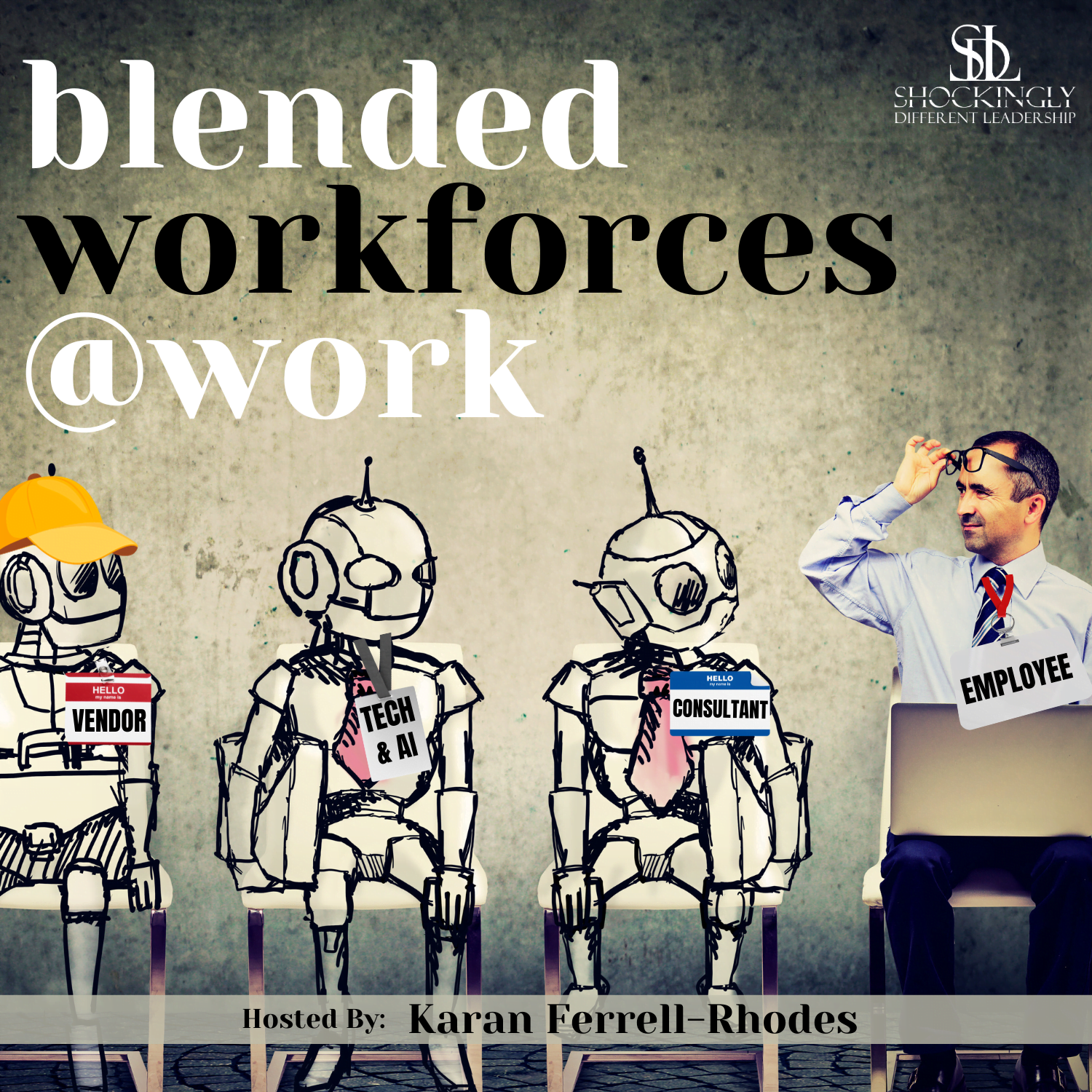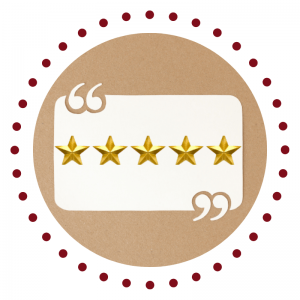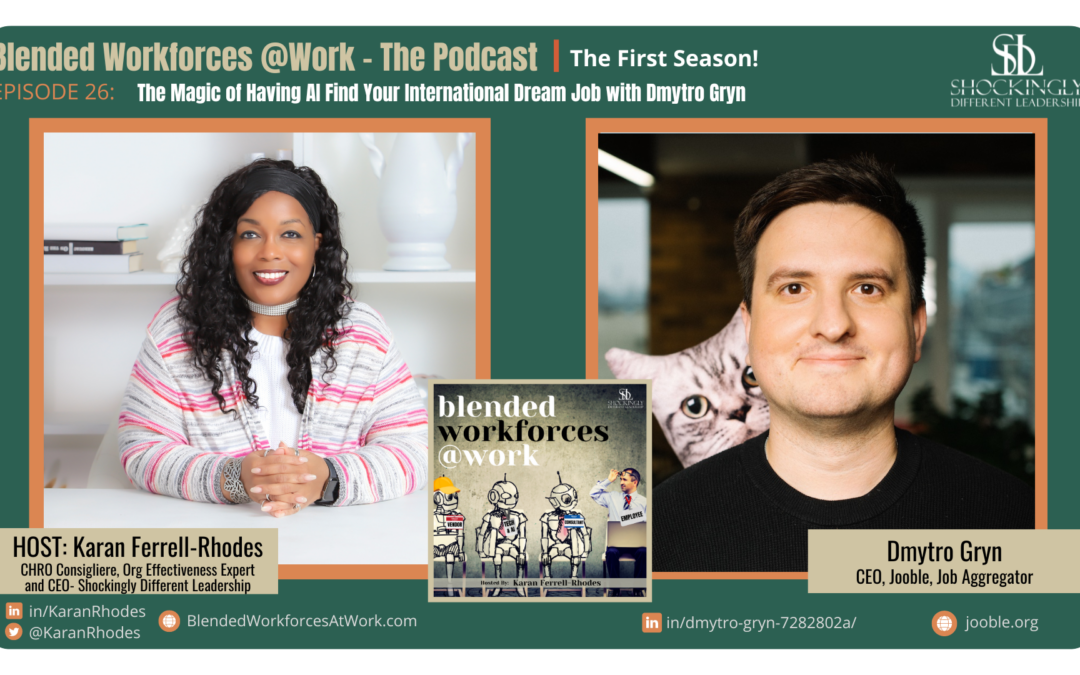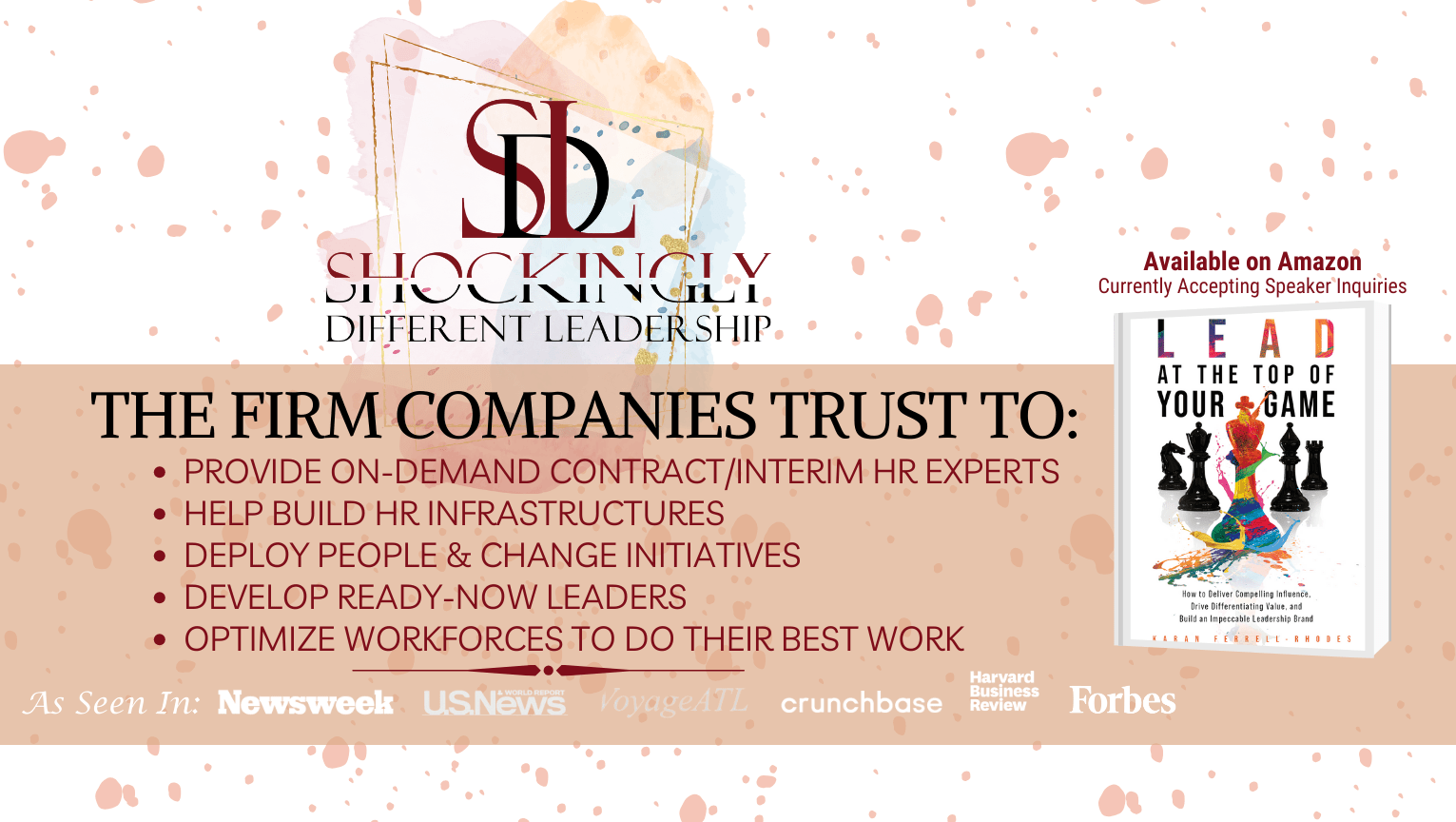IN THIS EPISODE, KARAN FERRELL-RHODES INTERVIEWS DMYTRO GRYN.
In today’s dynamic work environment, the nature of employment is shifting, with significant differences between full-time positions and freelance projects. Maintaining correct job advertisements is especially difficult when it comes to freelancing work, so some businesses have decided to concentrate only on full—and part-time positions.
Dmytro Gryn is the CEO of aggregation at Jooble, which consolidates job opportunities from various websites and offers personalized job recommendations and promotions. Despite the rise of Gen AI, Jooble prioritizes value composition and technology delivery. Jooble, which employs 300 full-time employees, the majority of whom are based in Kyiv, Ukraine, maintains flexibility during the war through sympathetic management.

Posted by
SDL Media Team
Rather view our video podcast?

WHAT TO LISTEN FOR:
- What is the role of technology in business?
- How does empathy impact employee performance?
- What are the potential consequences of making a mistake in a full-time job compared to a freelance project?
- How can consistent communication help align employees with the company’s goals?
- Why is repetition important in communication for influencing a team?
“When you are honest with people, they are ready to face hard challenges.”
FEATURED TIMESTAMPS:
[04.08] Dmytro clarifies the purpose behind the establishment of Jooble.
[07.01] How Jooble makes a wonderful customer experience.
[09.01] Business is about the value, not about some new technology.
[11.12] Working in the middle of a war conflict.
[14.28] Freelancer engagement and reduced turnover.
[19.18] Distinguishing between full-time positions and freelance projects.
[24.45] Signature Segment: Dmytro’s tactic of choice: Leading with the executive presence.

ABOUT DMYTRO GRYN:
Dmytro Gryn is an expert in the information technology industry with 17 years of experience. He joined the Jooble team in May 2007 as a Software Engineer, becoming the company’s first employee after its two founders. Before becoming CEO of Jooble Job Aggregator, he worked as an engineer, team leader of the development team, and CTO of Job Aggregator.
Dmytro led Jooble’s international expansion into foreign online recruitment markets, created and managed all necessary processes, and built and trained a team. As CEO, he is now responsible for improving the company’s ability to create more value for Jooble’s customers.
LINKS FOR DMYTRO:
- Website – jooble.org/
- LinkedIn – linkedin.com/in/dmytro-gryn-7282802a/
ADDITIONAL RESOURCES FOR YOU:


Episode Sponsor
SDL is the go-to firm companies trust when needing to:
- supplement their in-house HR teams with contract or interim HR experts
- implement leadership development programs that demonstrate an immediate ROI and impact on the business

Episode 26 | The Magic of Having AI Find Your International Dream Job with Dmytro Gryn
Dmytro Gryn 00:00
We are totally not ignoring Gen AI, but we are not standing at the point that Gen AI will solve all our problems, because at the end of the day, the business is not about some kind of technology. It’s about value composition and technology is just a tool to deliver the way.
Karan Rhodes 00:03
Blended workforces are one of the hottest talent strategies today, where employers are using a mix of traditional employees with external resources like independent contractors, coaches, consultants, vendors, and technology solutions, all in order to enhance competitiveness, ensure cost flexibility, and expedite business goals. But how are the successful companies infusing blended workforces into their business strategy? And what are the critical success factors and pitfalls to avoid during implementation? And on the flip side, what does it really take for suppliers to improve their chances of finding and landing contract opportunities? The devil is in the details, my friends! I’m your host, Karan Ferrell Rhodes, and it’s time to get smarter about Blended Workforces at Work! Hello, my superstar. This is Karan, and welcome to another episode of the blended workforces at work podcast. We have a treat for you on today’s show, we’re absolutely thrilled to have as our guest, Dmytro. I might have mispronounced his name because he know me in my southern drawl, but we’re going to go with it. Dmytro Gryn, who is the CEO of a company called Jooble, and Jooble is an international job aggregator and job posting search engine that helps professionals discover new opportunities, to explore new companies and to kickstart their careers. I was so excited to invite him on the podcast today, because we all know the importance that technology solutions have, both on blended workforces and on the world of work in general. And come to find out, they also have some experience with in their company as well with freelancers. So we’re going to tap onto a little bit of all of that. But we are so happy to have you on this episode. Dymtro. Welcome.
Dmytro Gryn 01:59
Thank you for inviting me.
Karan Rhodes 02:01
Oh, absolutely. And we can’t wait to learn more about the company and how you all are really helping to make a difference in the world. But before we delve into all of that, we always love to know just a tad bit more about our guests. So for just as much as you feel comfortable, can you give us a sneak peek into your life outside of work
Dmytro Gryn 02:22
Easy. My name is Dmytro. I live in Kyiv, Ukraine. I’m married. I have a dog. I play a bit of a guitar right here, and I’m going to become a salesbot Captain when the war in Ukraine will be over.
Karan Rhodes 02:38
Oh, really, that’s fantastic. That is amazing. And so we had to have listeners. We had a chance to do a little pre chat before this session. And and so I know we’re all especially since a lot of my listeners are in the US and Europe, you know, we’re very sensitive to the war that’s going on in Ukraine, and we, our hearts and prayers really go to the community, the international community of Ukraine, because there are citizens that are located throughout the world that this is top of mind for them for so we’re very, very honored to have you all you Know, on the podcast in you know, we’re really thinking about and hoping that the war will come to an end very soon. So just wanted to have a personal point of privilege to say that. Okay, well, let’s dive in. And I know I did not do Jooble justice and its description. So if you wouldn’t mind, Dimitri dimitrio, could you share with us why Jooble was founded and what you all actually do?
Dmytro Gryn 03:48
Jooble was founded in 18 years ago, in 2006. Jooble was basically at the first place response of our founders to the situation of job search market that was extremely hard to find a job or or an employee, because the huge amount of opportunities was fragmented on the on the different website. So if we have the best and the most popular and the largest job board in some countries, usually they do have posted like 20% of the unique job opportunities. And if you really want to find the best, the jobs that use you the best, you will need to go through dozens of sites at least. So they decided that we will, we will set up the site which will allow you to look through all of them just just one time.
Karan Rhodes 04:48
That’s amazing. And if you are looking for a new role or a new job opportunity, having such an aggregator saves that person a lot of time when time is of the essence, because most people really need to find another job very quickly. So I’m curious, how does your business model work? How do you all make revenue? Is it via ads? Is it via partnerships or some other method that would be boss?
Dmytro Gryn 05:17
Actually, we have some ads well our websites. It’s not the secretive, you can see them with, with the bare eyes. And of course, we we offer, we offer our partners, our clients, to to promote, promote their jobs on our platform. So when, when the job seeker have a wide choice, it’s really hard to grab the attention with, with your with your offer, because they may be very single, and we offer this promotion, we will highlight, we will recommend, we will do the match, personalized, match your job Boston, with that, with the job seeker. We can afford that, because we have a huge amount of data for for all the years we have a huge amount of data, then we will have, like, freely enhanced internal machine learning algorithm to do that, so when we also earn revenues of job postings, oh, very interesting. Very interesting.
Karan Rhodes 06:16
Now you being CEO, I’m sure there are a lot of things that are top of mind for you to in order to keep the the business in the best competitive position it can be, and while also serving your customers. Can you share a couple of things that you’re focusing on right now to ensure that Jill bowls experience is, you know, wonderful for the clients that you serve.
Dmytro Gryn 06:41
Yeah, our our main goal right now is he’s going even deeper with the personalization I already mentioned. Because hard thing about Job Search markets right now is that with the raise of generated AI technologies we do have like, we are bombed from every side with with advertisements, and we know that behind one actual job posting, we could have 1000s of advertisements, and it’s hard for the person just to to filter that, to understand that actually you can send your CV 10 times for the different advertisements, but you’re still applying for the same job for the same table. So we see our mission to build the kind of personalized system that will allow you to match directly with the job posting, skipping all these ads, yeah, but, but highlighting the most important parts of job postings for you, because when you have 1000s of ads, it is hard for user, for the job seeker, to look through them, but for our system, it’s really easy To merge them and to understand this final job description even better to match it with our jobs again.
Karan Rhodes 08:06
Interesting. Do you have any concern, because every leader that I talk to on the podcast envisions Gen AI to eventually adapt, cause them to have to pivot or adapt or improve the way you, you know, deliver your services. How do you anticipate, are you using Gen AI now number one, and then number two? How do you anticipate? I knew the answer. You to talk a little bit more about it. But how do you see it impacting your strategy, movement forward.
Dmytro Gryn 08:42
Okay, I, I will not, I will not say about our strategy, detailed and
Karan Rhodes 08:49
Okay, no, please don’t.
Dmytro Gryn 08:52
But in general, my view is, is like the following the Gen AI is a great tool which can’t deliver the value just itself. So with the like internet is a great tool that can deliver the weather itself, but the company that will onboard new technology and that will find the most efficient way to enhance its value proposition using this new technology, of course, will win against the company who wouldn’t. So no, we, we are totally not ignoring Gen AI, but we are not standing at the point that Gen AI will solve all our problems, because at the end of the day, the business is not about some kind of technology. It’s about value composition and technology is just a tool to deliver the way.
Karan Rhodes 09:46
Now you are so kind to share. Well, people, my listeners need to know it’s you’re you’re not a solopreneur. This is a very established company with many employees, so I’m curious, as most of your workforce in a single location, or is it distributed throughout the globe?
Dmytro Gryn 10:03
Right now speaking of full time employees, we have 300 full time employees, most of them are located in Kyiv, Ukraine. It will be about 200 the rest of them, 5050, or either in other cities in Ukraine or abroad, but the most of full Thailand, please, are still Ukrainians.
Karan Rhodes 10:27
How do you manage with the war conflict that’s going on right now? Because I’m sure there’s disruptions, there’s air raids, you know there’s I’m sure there are things that you all have to focus on sometimes that are unexpected, that might be in the middle of a workday, right? How are you all managing to be very flexible and agile based on what comes up?
Dmytro Gryn 10:52
First of all, we have no choice. We need to be flexible and agile to survive. Yeah, but speak of work related matters. We understand that the times are extremely hard. So when we decided to switch our management mode from just demanding management to to support in management that meaning emotional support, meaning deep, empathic conversation, meeting sometime that myself like CV for a manager, the thing I did the most through the last three years is forbidden people to work, to overwork, basically because the people during the war, they’re trying to escape From the reality into their jobs who have no worked, and they just starting to do stuff 12 hours a day. 14 hours a day. When I was young, I thought that it’s a good idea at work 14 hours a day. Right now, I’m not so young, I don’t think that’s a good idea So, yeah, we switched to that supporting and empathetic mode with people. And I think that this really works out. And I know that not every company do those kind of things. We were completely honest with our people. We are not trying to sing them some lullabies at our la, da, everything, winkagoo, just become Androids and such. So when you’re honest with people, they are ready to face some challenges, to face hard things. They’re not paralyzed when something happens. Yeah, of course, on basic level, we are doing huge amounts of job to make our office the place that always is online with electricity and such as such and such. But yeah, with speedbook, it’s, it’s empathy and support. First of all,
Karan Rhodes 11:55
Oh, you’re pretty young… Fantastic. I totally understand that it is, is it sounds like he is a CEO. You’re very agile yourself to stay close to the needs of you know your employees and and provide support
Dmytro Gryn 13:02
I Not always, not always. Was a CEO. I started as a software developer and was a scrum master, actually, Scrum Master. So, yeah, that’s why, maybe, maybe, and I’m so agile,
13:16
oh
Karan Rhodes 13:16
Oh, gotcha, I did not know that about your own. That’s amazing. You know, I used to work at Microsoft, so I’m, you know, quite familiar with a lot of the different skill sets that are needed for technology companies. So I did not know that’s interesting. Wow, from scrum master, and look at you now. Leading up such a wonderful, wonderful company, you were so kind to share that there were you have some experiences with onboarding freelancers, and I’d love to hear some you know the story behind that, as well, as if you could share the story around the division that you all were trying to create around Having a freelancer on your site for opportunities, but why you made the business decision that that might not be the best for Jooble. Would you mind sharing those stories with us?
Dmytro Gryn 14:06
Yeah, sure. So about our freelancers, I will split that there’s the story in two, because we as a company, we have freelancers of two lane types. The first one is mass hiring when you need to do like stone, standard, typical work we need usually, usually hire data mapping or data entry specialists. We have a lot of data whether to do data science. So we need with data mapped and look at the project on the peak, we had like 100 specialists working as a freelancers on a daily basis, and we realized that, you know, data mapping is not actually a dream job, I guess. So we’ve had a problem with with engagement and with turnover. And turnover is pretty painful because to feel the place when people are are leaving. So we decided what we what we could do to engage the people, and we implemented in our platform where they was working with the data. We implemented a simple gamification mechanism, like they had achievements with badges for some kind of some kind of work done yet, and we have a little leader leaderboard. And on the leaderboard, they can challenge each other for the first three places, and then the leaders and people who get enough badges, they could use it to buy our corporate merch. So we will, we will send them. There’s all remote workers all over the Ukraine at the point of time, but we were selling by by post corporate merge, and that’s really, that really impacted well our turnover declined like two times. Yeah, so that’s with this part. Of course, we are technology company. We have a development with different products, prototypes, and we need to grow our R and D team on a project basis sometime. So here we’re using not, maybe not very typical approach. We onboard the freelancer to the company and business context as they would be just regular, full time employees, and when the project is over, we are still communicating with them, so we prefer not to search for a new person every time, but to have a content base of people who work with us and we did good to offer new projects to them so they already know about the business context and some updates, just some updates will be needed to perform. And my favorite part here a significant amount of these R and D freelancers are former durable employees, interesting who are working at their new places, but they’re still willing to to have some, some geek to to earn some money. So that’s we’ll win. They want a geek, and we want to persons who are already know something about the business, about the technology infrastructure. So we, we just, uh, we’re just working with them.
Karan Rhodes 17:37
See, that’s fascinating, because in the US, it’s very rare that I would say very rare. It was probably rarer than probably overseas that because we have so so many laws around gig workers and freelancers and how employers can interact with them that many don’t stay in touch with them, you know, after they leave the company. But I think that is such a smart strategy, because they know your company. They know how it works. There’s very little ramp time to start a new project, and you get those skills immediately and get them productive immediately by keeping them in their, you know, own special group that you can tap onto them when needed. That is extremely smart to be able to do. And it sounds like the employment laws in Ukraine allow you to to do that in a an easier than way than maybe in this in the States
Dmytro Gryn 18:39
Ukraine allow you to have have one full time job and not full time jobs. In addition.
Karan Rhodes 18:48
That’s interesting. So and can you share again about the second one, about the why? There’s no such thing as the successful projects aggregator?
Dmytro Gryn 18:57
Yeah, it’s hard. We we tried to do one by our own. There are two main differences, the doing, like searching for full time job and searching for a project, one from the value proposition side and one from the technology side. So our core idea that if you are working with the job at Brigadier, you can find the perfect, the most suitable job for you, because we do have all of them on the same platform and working with with the freelance projects and with the end users, we realized that this is not The Case for them, because the the price of the price of the mistake when you’re a workplace is really high. You will waste your your your time, you you will become crazy and out, ladies, yeah, and sure, there’s really high risks. But with the freelance project, the price of the mistake is extremely low, usually short term. And you know, the worst thing that you will get, you will be sad and have a few beers in the bar after work, and that’s all. But still, if a tool would be easy to implement, we might do that, or anyone might do that. But there is a huge technical, technical problem with that. The problem is still intact with a searching for a full time job, because they’re popping up and disappearing very fast. And when you have, when you have a millions, millions of job postings in your database, and you need to be sure that they are all still open and still are still looking for applicants. The timing there is at least a few days, so you don’t need to invest that much into performance and into infrastructure for keeping the data fresh and with a freelance projects when they when they pop out and disappear in a half an hour, you will need to print that huge bag of money just to solve that task, to your project, to be helpful. So when we were thinking about it, we tried to do that. We were aggregating freelance jobs, but we through the data, through the ad tests and through the communication with customers, we realized that the value is low and the technical complexity is really high, so we calculated the money and decided, okay, that’s not really a good investment. And since there it was, I don’t know, like, like 80 years ago, Jubo is not working with with any kind of freelance jobs, and we are focusing on helping to find a full time workplace, or maybe a part time workplace. But still, it’s about joining the company, not just doing project, yeah, so I think other people just do the same math, and that’s why we don’t have that kind of solutions.
Karan Rhodes 22:12
You know, I think you’re spot on. Because, you know, even in my business, you don’t know. And we support human resources, Strategic Human Resources consulting, and you don’t really look on job boards for projects, it’s really they pop up during a staff meeting at a company, and hopefully someone in your network hears about it and reaches out to you, or knows about your company, and it comes to you, but I can imagine the return on investment is very low for such an aggregator, when it’s hard to when the culture right now is not to post a lot of these projects. And to your point, they pop up and pop away so quickly he’s take advantage of the opportunity, and it sounds like a good strategic decision, business decision, to stick with what you’re doing now a reliable model. You know, that sounds interesting. Well, gosh, it’s fascinating. I could talk to you for hours, but we’re running a little bit short on time. But before we let you go, we have a signature question that we always ask our guests. And as you know, my company did research and wrote a book on leadership execution. And you know, in the world of work, everybody needs to sharpen their skills a little bit. But out of our research, we found four bucket areas that are very important, no matter your job or initiative that you’re working on. And we love to ask our guests which of the seven we write about really resonated with you, and all equal is important, but for you, you were so kind to share that leading with the executive presence really popped for you, and for my new listeners out there, leading with executive presence is all about making you know clear and convincing, either oral, written you know, presentations or sharing your perspective or point of view to others in a way that influences them to follow your lead. So I’m sure you value that, especially in your role as CEO dimitro. But can you share with us why you think executive presence is an important skill for anyone to have,
Dmytro Gryn 24:24
Uh, sure you see, from my point of view, the idea that the manager somehow directly manage or control the business is an illusion. The only thing that manager actually do is communicating with with people. So thinking about executive presence, I am talking to you about the communication is not just make one presentation and make one post in kind of corporate messenger or write an email. Umm, communication, as you know they say when you are sick of repeating it, then you are just starting to be heard.
Karan Rhodes 25:11
There you go.
Dmytro Gryn 25:11
So you need, you need the constant presence and repeating your communication to influence the people in a good way and to help them to go aligned and drive the company. So that’s why the executive presence is the most important.
Karan Rhodes 25:29
Well, I gotta high five you on that one. That’s a great perspective to share, and you’re right. That is why it’s so so very important. And anything that you, you know, do, especially in your professional endeavors as well. Well, we’re going to have all a lot of information about you, your bio and links to your company in our show notes, but I always love to give our guests a little bit of air time to share where folks can find your company or find you if they’re interested in reaching out. So where can what’s the website for Jooble?
Dmytro Gryn 26:04
That would be jooble.org that will show our our websites for United States, and at the bottom of the page, there are link for other 66 countries where we are working. Yeah. So you can find the link today, maybe to find it on Twitter, but I actually don’t write that anything I just had with widows.
Karan Rhodes 26:25
Oh, well, we’ll definitely have the links that you share with us in the show notes, so listeners make sure you definitely take a look and and get in touch if need be. But definitely leverage Jooble, because it is a fantastic job opportunity aggregator, and can be a fantastic tool as you’re looking for your next best opportunity. So I hope you all take a definite Look at that. Well, that’s all the time we have for today. But thank you, Dmytro, for your time, your efforts helping us to better understand the world of job aggregators and much continued success to you and your teams,
Dmytro Gryn 27:11
That was my pleasure. Thank you for inviting me
Karan Rhodes 27:14
Awesome. And thank you to listeners for the gift of your time, because we do know that there are literally millions of other podcasts out there that you could be listening to, and we do not take your patronage slightly. All we ask that you please be sure to like and subscribe and follow in your favorite podcast platform or choice and just share our podcast with your best friend, because by doing so, it will help us all get smarter about blended work versus at work. Thanks a ton and see you next week. Well, that’s our show for today. Thank you again for listening to the Blended Workforces at Work podcast. You can check out the show notes, additional episodes, bonus resources, and also submit guest recommendations on our website at blendedworkforces@work.com. You can also follow me on Twitter, LinkedIn, Instagram or YouTube by searching for the name Karan Rhodes with Karan being spelled K a r a n. And if you like the show, the greatest gift you can give would be to subscribe and leave a rating on your favorite podcast platform of choice. This podcast has been a production of Shockingly Different Leadership, a global consultancy which helps organizations execute their people, talent development, and organizational effectiveness initiatives on an on-demand, contract, fractional, or project basis. Huge thanks to the SDL production and editing team for a job well done. Bye for now.

Want to be a Podcast Guest?
Check out our guest qualifications and submit our brief form to be considered.

Want Karan to be Your Podcast Guest?
- Blended Workforces & the Gig Economy
- Critical Execution Tactics of High-performing Leaders
- Entrepreneurism & Leading Your Business

Want to be a Podcast Sponsor?
All sponsorships come with a featured spot on show notes pages.

Like the Show? Please Leave a Review
If you like the show, it would mean the world to her if you left a quick review.
Your word is golden, so a HUGE thank you in advance!

#KeepInTouch
via our podcast alerts
Subscribe now to discover why thousands of monthly listeners who are passionate about doing their best work prioritize time each week to listen to the Blended Workforces @Work podcast.
#AboutSDL
#WhereToFindUs
MAILING
4480-H South Cobb Drive
PMB 219
Smyrna, GA 30080
PHYSICAL
2121 NewMarket Parkway
Ste. 108
Marietta, GA 30067
#ContactOptions
Customer Service Email:
service@shockinglydifferent.com
Call or Text:
770-384-1103
#Office Hours
MON-FRI
8:30 AM – 6:30 PM
Weekends By Appointment






